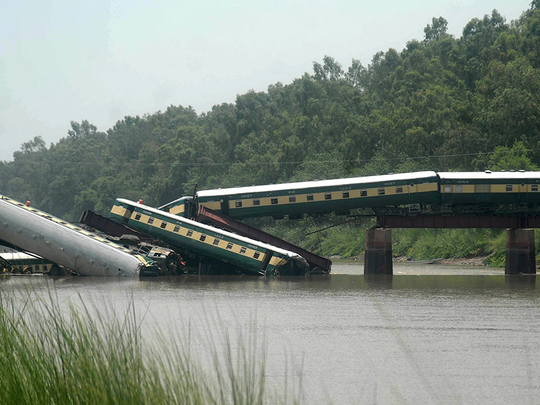
The cause of the tragic death of 17 army officers and soldiers travelling on an ill-fated train, which fell from a collapsing bridge into a canal in central Pakistan on Thursday remains a matter of speculation. Pakistan’s railway officials were quick to turn down suggestions of the tragedy being the consequence of an act of terrorism while also jumping to claim that the bridge in question was capable of handling railway traffic. But something indeed went wrong that caused this bloodstained episode.
Official explanations aside, the bridge in question according to Pakistani media reports was built in British colonial times. Alas, this is just one of a large number of monuments across Pakistan that were built by British colonial rulers, albeit to suit the needs of South Asia’s foreign masters. And yet, while living in a decolonised and independent country, life for Pakistanis including many afflicted with unending daily pain is far from perfect.
The train crash coincided with continuing reports of low income and electricity-deprived neighbourhoods across the southern port city of Karachi suffering more than just the consequences of a continuing heat wave. More than 1,200 people have died since the arrival of brutal summer temperatures combined with ever growing electricity shortages and a virtual absence of water supply. What could be worse? Possibly an active war zone.
Whimsical choices
Ironically, these troubling times have coincided with Prime Minister Nawaz Sharif pressing ahead with one whimsical choice after another, while visibly paying little more than lip service to real life challenges.. Seemingly ignoring the plight of mainstream Pakistanis and their unending pain, Sharif’s government so far appears to have utterly failed in tackling the country’s most pressing issues. Just days before Thursday’s tragedy, Sharif formally inaugurated a new expressway which is meant to eventually Islamabad with the suburban town of Rawat.
The project will supposedly allow a free flow of traffic without any signals along the way, cutting down time for travelers to and from the capital. Ironically though, neither Rawat nor Islamabad are able to assure a reliable supply of electricity or water to the poorest of the poor neighborhoods. In recent weeks, rising summer temperatures have coincided with severe water shortages across urban Pakistan including Islamabad, just adding grief to the ongoing pain.
The capital’s irony is indeed all too visible for those who have recently seen Sharif’s government formally launch a new air-conditioned bus service, inaugurated by the prime minister amidst much fanfare. Known as Islamabad’s metrobus, the project is indeed in line with the ruling structure’s refusal to accept the writing on the wall. While Pakistanis suffer in pain, the ruling structure presses ahead with its fanciful choices ignoring the needs of ordinary Pakistanis.
The Islamabad bus project has followed a similar venture earlier undertaken in the city of Lahore-Sharif’s home town. Ironically though, even Lahore’s poverty stricken neighborhoods present a dismal picture of brutal energy shortages just like other parts of Pakistan, with their home grown leader showing little capability of providing hope for the foreseeable future.
Going forward as Pakistan battles multiple challenges, Sharif and other members of the ruling structure continue to pursue their choices which are hardly in sync with Pakistan’s rapidly growing needs. A new train project is planned to run in Lahore and that too on electricity, further aggravating the existing shortages. Another train project is planned to run from Islamabad to Muzaffarabad in the mountainous region of Kashmir. Indeed, such ventures promise to gobble up billions of Dollars which Pakistan will end up borrowing and subsequently adding to the cost of keeping up with its ever growing debt payments.
For ordinary Pakistanis, any number of fanciful projects just do not provide hope for a more promising future. In contrast, they only promise to aggravate their daily living conditions. Ending the growing pain for Pakistanis requires more than just a mere policy shift. Indeed, there has to be a radical shift not just in the thinking processes but also in terms of the choices made. The aggravation surrounding poorest of the poor Pakistanis is so immense that nothing short of a national emergency is urgently needed to make a difference.
Pakistan’s ruling elite in fact need to halt the country’s under execution or planned fanciful projects wherever immediately possible. To manage the crisis, there needs to be a fresh and concerted push on diverting all available resources on just three pivotal areas.
First, a holding operation across Pakistan must immediately be launched to revisit elements of the country’s infrastructure in need of urgent repair. Rather than embark on new ventures like the bus projects or new train lines, it is vital that Pakistan’s existing assets such as the bridge which collapsed under the weight of the passenger train on Thursday, must first be visited and protected on an urgent basis.
Second, any new initiatives must squarely just focus as never before on tackling energy and water shortages. Given the way the heat wave across southern Pakistan has just recently highlighted the human risk involved, its essential to assure adequate electricity supply along with water supply across the board notably poverty stricken neighborhoods. It is far more vital for Pakistanis to witness an end to their miseries rather than live under the burden of Sharif’s fanciful projects made through borrowed money, which carry little relevance for deeply deprived neighborhoods.
Finally, Pakistan’s rural areas are clearly being ignored. The country’s agriculture is indeed the most crucial backbone for its survival. Revamping agriculture rather than spending more on fanciful urban projects.
These changes are essential to reinvigorate Pakistan’s economic direction just at a time of an ever growing yawning gap between the backers of ill-advised dream projects as opposed to the powerfully compelling reality on the ground.
Farhan Bokhari is a Pakistan-based commentator who writes on political and economic matters.










